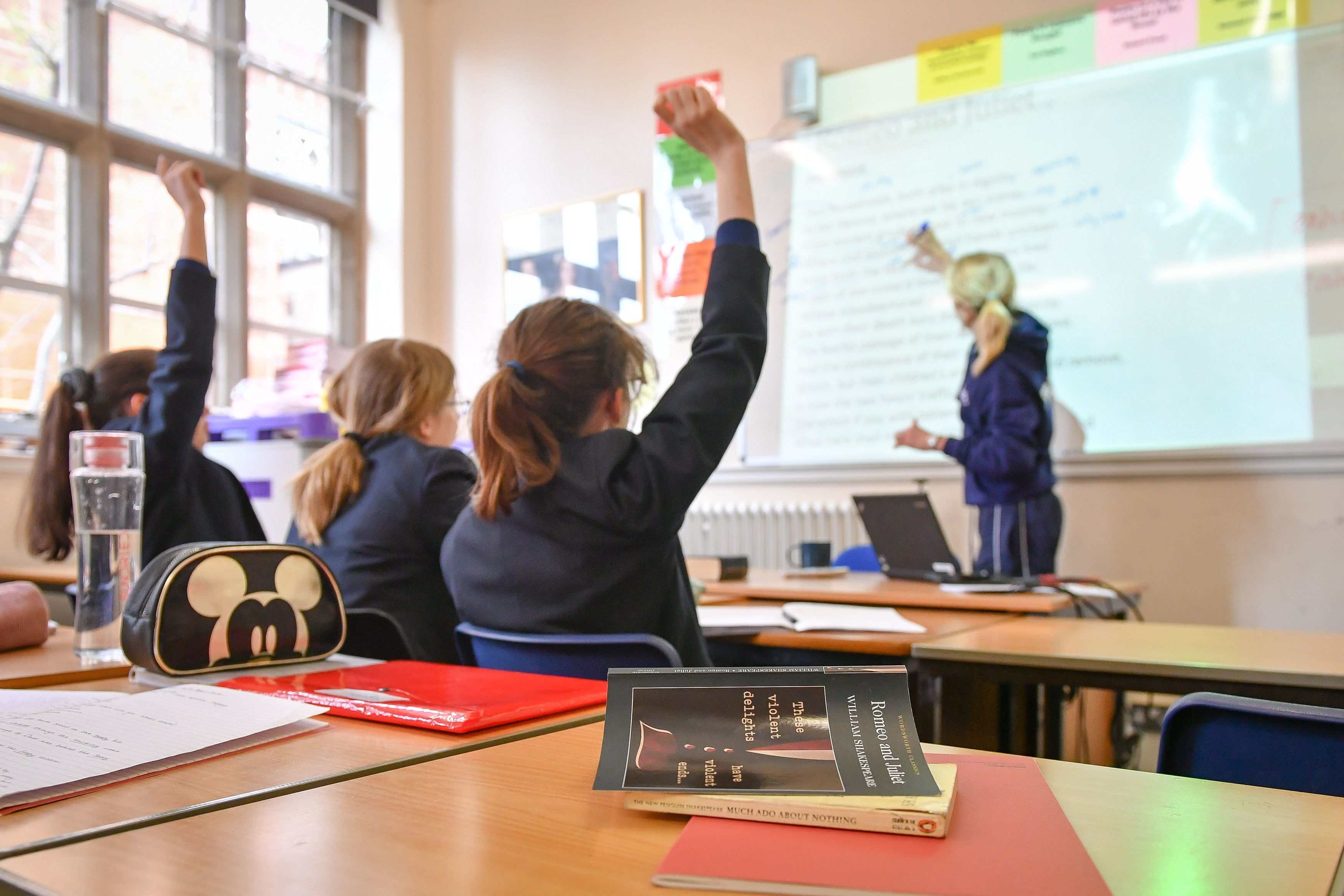Schools to bring back online lessons and Covid-style classes if teachers strike
Unions warn ‘the stakes have never been higher’ as they prepare to vote on walkouts that could start within weeks
Your support helps us to tell the story
From reproductive rights to climate change to Big Tech, The Independent is on the ground when the story is developing. Whether it's investigating the financials of Elon Musk's pro-Trump PAC or producing our latest documentary, 'The A Word', which shines a light on the American women fighting for reproductive rights, we know how important it is to parse out the facts from the messaging.
At such a critical moment in US history, we need reporters on the ground. Your donation allows us to keep sending journalists to speak to both sides of the story.
The Independent is trusted by Americans across the entire political spectrum. And unlike many other quality news outlets, we choose not to lock Americans out of our reporting and analysis with paywalls. We believe quality journalism should be available to everyone, paid for by those who can afford it.
Your support makes all the difference.Schools are planning to bring back online lessons and Covid-style classes for vulnerable children as they prepare for expected teachers’ strikes, The Independent has been told.
Ministers also hope schools can join together to share resources, raising the prospect of pupils being transported to different premises for their lessons.
The government is drawing up contingency plans for possible walkouts across England, with two of the UK’s major teaching unions – the National Education Union (NEU) and the National Association of Head Teachers (NAHT) – due to unveil the results of strike ballots on Monday.
The National Education Union said it is confident that teachers will back the proposed walkouts, and believes that industrial action could begin as soon as 30 January.
In a meeting last week, education secretary Gillian Keegan warned unions that “the stakes have never been higher” in relation to strike action because it would affect children whose education has already been harmed by the pandemic.
Paul Smith, the CEO of The White Horse Federation, an academy trust with 31 schools, said that while he respects the right of teachers to strike, his trust has a “moral responsibility” to balance that right with the needs of everyone, “especially those who are most vulnerable”.
He said that if the NEU ballot meets the threshold for industrial action, his organisation “will be introducing Covid-like arrangements so that the most vulnerable students and those from keyworker families have a safe and warm place they can come to during any industrial action”.
The group is also planning to provide lunch for all those eligible for free school meals.
But he said he hoped ministers and the trade unions would find a solution to avert strike action. “The last thing our students should have to endure is more days without school,” he said.
Seamus Murphy, the CEO of Turner Schools, an academy trust with five schools in Folkestone, said his organisation planned to provide online learning as well as in-person classes for vulnerable children and those preparing for their GCSEs and A-Levels.
He said: “Turner schools will remain open for vulnerable pupils and where possible be open for children in our exam year groups in years 6, 11 and 13. For those pupils who have to remain at home, we will provide online learning through our well-established digital systems.”
It is understood that ministers want schools that belong to multi-academy trusts to share resources on strike days, particularly if they already share a headteacher.
A government source said: “We have some fantastic heads who are highly innovative and creative, and I expect we will see some great examples of that in the eventuality of strikes.”

Dame Rachel de Souza, the children’s commissioner, has warned that strikes would put vulnerable pupils at risk, and criticised teachers for planning industrial action.
“As we face the prospect of teacher strikes in England, I feel more strongly than ever that this is the wrong course of action,” she wrote in The Sunday Telegraph. “It is damaging to children’s outcomes. It will disrupt their learning just as they are getting back on track [after the pandemic].”
Sam Freedman, who was an adviser at the Department for Education when Michael Gove was education secretary, said the two main options schools would have would be online learning and joining together in a bid to keep at least one site open.
“Most multi-academy trusts are geographically focused, with three or four schools in the same town or part of a city,” he said. “So [joining together] certainly would be an option. To say to parents ‘You’ll have to travel a bit further today if you want [your] kids in school, as we’ve got one site open.’”
He said schools “probably won’t” make much of live online lessons of the kind that exhausted many working parents during the pandemic. But he suggested there could be more use of pre-recorded online lessons, such as those created by the government’s Oak Academy when Covid was at its height.
Union leaders, however, have expressed doubts over the plans.

Geoff Barton, the general secretary of the Association of School and College Leaders union, said that if strike action goes ahead, any decision to keep a school open would have to be based on a “risk assessment considering the safety of staff and students”.
Any schoolwork set for pupils to do at home would also have to take into consideration “staff availability and workload to set and mark that work”, he added.
He said the “last thing” anyone wants is more disruption, but that there is a crisis in the profession caused by the erosion of teachers’ pay and conditions over the past 12 years, which is already damaging education every day.
“Rather than seeking to limit the impact of possible strikes, the government should tackle the root cause and provide teachers with a significant, fully funded pay award,” he said.
The Department for Education pointed to the fact that last week another union’s ballot fell short of the turnout needed to approve strike action.
A spokesperson said: “After two years of disrupted education for children and young people, families will be relieved that teachers from NASUWT did not choose to strike. The education secretary has arranged further meetings with union leaders to avoid harmful strike action.
“We have already met the unions’ request for a further £2bn for schools, both next year and the year after, in the autumn statement, and awarded teachers the highest pay award in 30 years.”





Join our commenting forum
Join thought-provoking conversations, follow other Independent readers and see their replies
Comments